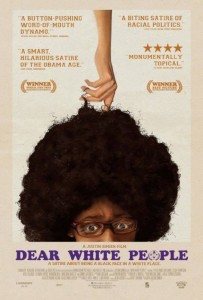It’s hard not to burst into conversation as the credits begin to roll for writer and director Justin Siemen’s Dear White People. The racial satire “about being a black face in a white place” takes aim at Ivy League institutions while following a militant radio jockey who hosts a show bearing the same name as the film, a gay nerd struggling to fit in, and a politician-in-training/son-of-the-dean, just to name a few of the many, many subplots that weave in and out of one another.
The script supplies a fair share of laughs, and Siemen isn’t afraid to show some directorial flare in shooting the film, but there are some pretty serious script fumbles along the way, so much so that watching Dear White People pretty early on becomes more a mission to extract meaning than to have fun.
But it seems so far that the general consensus is that Siemens comes up big in the meaning department, receiving critical praise including being called the “Spike Lee of the millennial generation.” It’s not hard to see where Siemen’s work draws its importance, though. Race on college campuses has been a consistent point of discord, especially within the Ivy League. A group of minority students at Harvard hosted the campaign “I, Too, Am Harvard,” grabbing national news attention. The credits sequence alone cites a string of blackface parties at colleges across the country, including the “Bloods and Crips” party at Alpha Delta in the summer of 2013 (though the film refers to the College as Dartmouth University).
There’s some tension, though, in viewing the movie as a student of just the kind of institution that Dear White People means to satirize. Dear White People is set at Winchester University, whose academic prestige and job placement record is cited by the characters in just about every other scene. Siemens clearly means to relate the University to its real life antecedents, but at the same time his desire to satirize compels him to make some aspects larger than life. The ending credits help him get away with both by linking the over-the-top blackface party that serves as a culmination for the many subplots of the film to the real world. But it’s not clear if this works to support the hundred or so minutes preceding it in the same way.
Are there really hyper-tone deaf editor-in-chiefs of prestigious campus magazines who say things like, “Sometimes I think the hardest thing to be in the American work force is an educated white guy”? Or claim that through affirmative action Obama somehow robbed the presidency from the guy who lost his seat at Harvard to make room for him?
Certainly. But the issue is that in terms of the weight of the themes Dear White People is set on exploring, these questions shouldn’t distract, even though they frequently do. It’s not to deny the possibility of white people saying tone-deaf things on racial issues either, or that the tone-deaf editor-in-chief type might actually exist. But when you pack so many cliché’s into one character (this guy also constantly walks around with perpetually rolled up shirt sleeves and a pack of muscly foils who mostly grunt and say insensitive things) you feel bound to question just how closely the film is linked to reality. And in the capacity of a white, male college aged movie goer, starting to feel like denying the movie’s accuracy at once feels like just the kind of thing Siemen’s would probably say: “Of course you miss the point. You are the point.”
This places the white-male-college-movie-goer in a bizarre sort of double bind. If the white male-college-movie-goer doesn’t see himself or others in this character, that may be evidence of just how similar the white-college-movie-goer is to the subject matter, since they are both so racially oblivious. This whole path of reasoning leads to mostly a frustrating regress, but at the point where Siemens can cite an actual string of college parties featuring black face as a theme, maybe questions of simulacra and artifice are best just left at the door.
Stepping outside of that particular mess, Dear White People has its greatest worth in its exploration of reconciling identity with stereotype. Each of the main characters of color feel at once bound to form who they are outside of stereotypes and in spite of them. The militant radio jockey insists her favorite director is Spike Lee even though it’s really Ingmar Bergman. The politician-in-training smokes weed in total secrecy.
How do you form who you are when society gets so much input? What Dear White People makes clear is that college is the place where all these questions really matter. After all, four years are meant to, by and large, form the person you will be for possibly the rest of your life. Suddenly it makes sense that the stakes are so high, that whatever tensions exist in broader society are so much more palpable. Dear White People doesn’t give much in the way of answers for this process. The film’s Winchester University is, after all, only college.


Be the first to comment on "Dear White People: A Review"